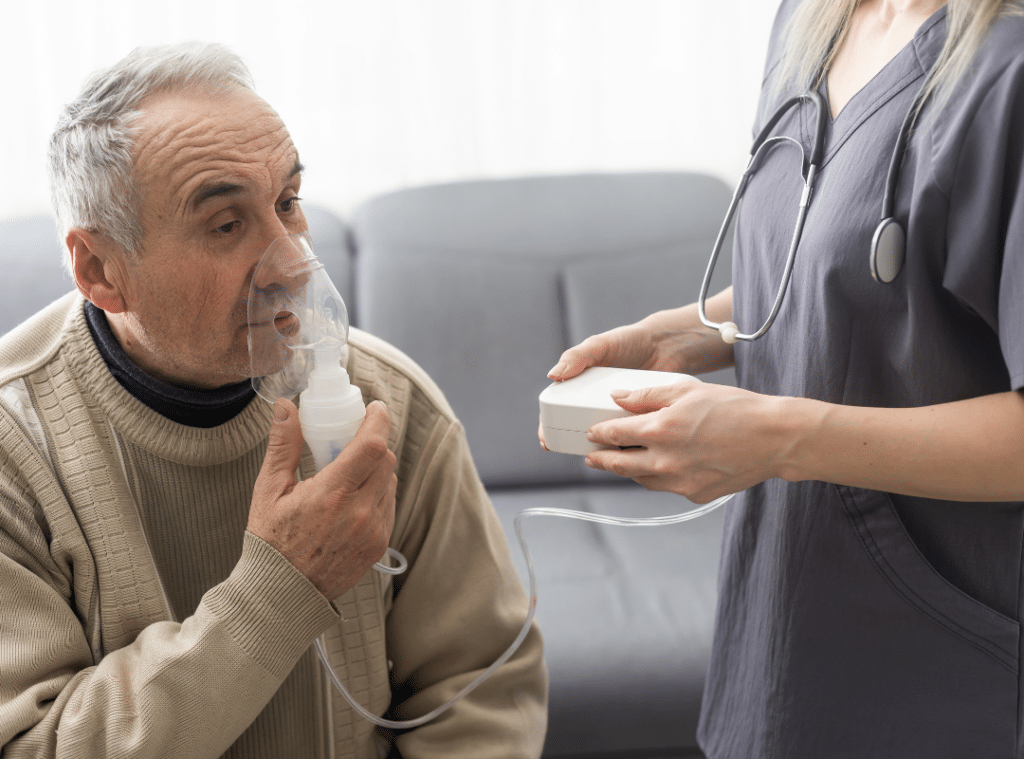Managing symptoms, understanding medications, and recognizing warning signs are all essential when treating an elderly cough at Westmont of Brentwood. You need to assess the individual’s health status and consider various treatments’ potential risks and benefits. It’s not just about choosing the right cough medicine or remedy; it’s about ensuring safety and effectiveness in a vulnerable population. As you navigate these considerations at Westmont of Brentwood, you’ll find that the path to effective treatment might reveal unexpected challenges and solutions. What should you prioritize first?
Elderly cough treatment
When treating coughs in the elderly, it’s essential to approach the situation with care and understanding.
You’ll want to assess the underlying cause of the cough, as this can vary considerably among older adults. Often, it’s linked to respiratory infections, but chronic conditions like asthma or COPD might also be at play.
Start by observing any accompanying symptoms, such as wheezing or a runny nose, which can guide you in seeking appropriate medical advice.
Remember, if the cough persists beyond eight weeks or disrupts daily life, it’s time to consult a healthcare professional.
When providing care, you can explore gentle remedies like honey or warm fluids, which can soothe irritation without harsh side effects.
Maintaining a smoke-free environment and using humidifiers can also support respiratory health. Additionally, it’s crucial to recognize seniors’ increased vulnerability to respiratory infections, which can greatly impact their recovery.
Always prioritize comfort and safety, monitoring for any signs of complications.
Your attentiveness helps manage the cough and enhances their overall well-being.

Best cough medicine for the elderly
After evaluating the underlying causes of a cough in the elderly, selecting the best cough medicine becomes essential for effective relief.
You’ll want to consider over-the-counter options like dextromethorphan, which suppresses the cough reflex, or guaifenesin, which helps loosen mucus. These medications can provide comfort, but it’s essential to choose wisely, given the elderly’s unique health considerations.
If the cough is productive and brings up mucus, an expectorant like guaifenesin might be more suitable. However, if it’s dry, a cough suppressant could be more beneficial.
Always read labels carefully, as some medications may contain ingredients that can interact with other prescriptions your loved one might be taking.
Natural remedies, such as honey, can also be practical and soothing. Additionally, staying current with recommended vaccinations can help prevent illnesses that may lead to coughing and other respiratory issues.
Be sure to consult a healthcare professional before starting any new medication or treatment, especially if your loved one has underlying conditions or is on multiple medications.
Dry cough in elderly woman
Many elderly women experience a dry cough that can be both bothersome and concerning. This type of cough often arises from various factors, such as allergies, dry air, or even certain medications.
It’s important to consider how long the cough lasts and any accompanying symptoms. If it lingers beyond a few weeks, or if you notice changes like wheezing or shortness of breath, seeking medical advice is critical.
To help manage a dry cough, consider using a humidifier to add moisture to the air, which can soothe the throat. Staying well-hydrated with warm fluids, such as herbal teas or broths, can provide comfort.
Over-the-counter cough suppressants may offer temporary relief, but consult a healthcare professional before using them, especially if she has underlying health conditions. Regular check-ups are essential to monitor respiratory health and adjust any medications contributing to her symptoms.
Encouraging her to avoid irritants like tobacco smoke and strong perfumes can significantly reduce coughing.
Finally, regular check-ups are essential to monitor respiratory health and adjust medications that might contribute to her symptoms.
Elderly coughing at night
Nighttime coughing in the elderly can be distressing, often disrupting sleep and leading to fatigue. You may notice that your loved one struggles to find comfort, which can be exhausting for both of you. Understanding the underlying causes can help manage this issue effectively.
Here are a few factors to reflect upon:
- Environmental irritants: Dust, pet dander, or smoke can aggravate nighttime coughs. Keeping the bedroom clean and smoke-free can make a significant difference.
- Positioning: Elevating the head while sleeping can help reduce coughing. Using extra pillows or a wedge pillow may provide relief.
- Hydration: Encouraging fluid intake throughout the day can keep the throat moist, reducing irritation that leads to coughing.
If nighttime coughing persists, it’s crucial to consult a healthcare professional. They can help identify any underlying issues, such as allergies or respiratory conditions, and recommend appropriate treatments. Additionally, respite care services can offer caregivers temporary relief from the stress of managing such health challenges.
Elderly coughing up phlegm
When your elderly loved one starts coughing up phlegm, it can be concerning and uncomfortable for both of you. Phlegm, which can be clear, yellow, or green, often indicates an underlying respiratory issue, such as an infection or inflammation.
It’s important to monitor their symptoms closely and note any changes in color or consistency, as these can provide valuable information to healthcare providers.
Encourage your loved one to stay hydrated, as fluids can help thin the mucus, making it easier to expel. A humidifier in their room can also create a more comfortable environment, soothing their airways.
If there’s persistent or worsening phlegm production, or if they experience additional symptoms like fever or shortness of breath, it’s vital to seek medical advice promptly.
While cough suppressants can provide temporary relief, they should be used cautiously, particularly in the elderly. Always consult with a healthcare professional before starting any new medication.

Chronic cough treatment antibiotics
Persistent coughing in the elderly can be a sign of underlying issues that might require specific treatment, including antibiotics. If you notice a chronic cough lasting more than eight weeks, it’s important to consult a healthcare professional. They’ll help determine whether a bacterial infection is present, which may necessitate antibiotic therapy.
Consider these points when discussing treatment options:
- Identify the cause: Understanding the underlying reason for the cough is vital, as not all coughs require antibiotics.
- Monitor symptoms: Keep track of any additional symptoms that may accompany the cough, like fever or wheezing, to provide your doctor with valuable information.
- Follow prescriptions carefully: If antibiotics are prescribed, make sure you complete the full course, even if the cough improves. This helps prevent antibiotic resistance.
Managing a cough in the elderly can feel like maneuvering through a maze, but you’re not alone in this journey. At Westmont of Brentwood, we encourage you to always consult a healthcare professional for persistent symptoms or concerns. Remember, natural remedies like honey and staying hydrated can work wonders while monitoring phlegm can guide your next steps. With the right approach, you can guarantee your loved one finds relief and comfort, just like a knight in shining armor swooping in to save the day! For more assistance, feel free to reach out to us at 925-516-8006.
Discover the level of care you or your family member requires. What Level of Care Do You Need?
Frequently asked questions
- Will breathing treatments for elderly pneumonia cause severe coughing?
Breathing treatments, like nebulizers, can sometimes cause temporary coughing as they help loosen mucus in the airways. However, this is typically a sign that the treatment is working to clear the lungs, and the coughing usually subsides after the mucus is expelled. - What can you give an elderly person for a cough?
For mild coughs, staying hydrated, using a humidifier, and consuming soothing remedies like honey or warm tea can help. Over-the-counter cough suppressants or expectorants may also provide relief, but it’s important to consult a healthcare provider before starting any medication. - What to do when the elderly is coughing?
Encourage the elderly to drink plenty of fluids, rest, and avoid irritants like smoke or strong odors. If the cough persists for more than a few days, worsens, or is accompanied by other symptoms like fever or shortness of breath, seek medical attention. - What medication is available for chronic cough?
Medications such as cough suppressants, antihistamines, or inhalers may be used to manage chronic cough, depending on the underlying cause. A healthcare professional may also prescribe medications like steroids or address contributing factors such as acid reflux or allergies. - How do you stop coughing fits?
Coughing fits can often be relieved by sipping warm water, breathing slowly through the nose, or using cough drops to soothe the throat. If the fits persist, medications like cough suppressants or techniques like controlled breathing exercises can be effective. - When should I worry about a cough in the elderly?
You should worry if the cough lasts longer than a week, worsens over time, or is accompanied by symptoms such as fever, chest pain, difficulty breathing, or fatigue. A persistent or severe cough could indicate an underlying infection, pneumonia, or other serious conditions requiring immediate medical attention. - Why do the elderly cough so much?
Elderly individuals may cough frequently due to age-related changes in lung function, weakened immune systems, or chronic conditions such as COPD, acid reflux, or heart failure. Medications like ACE inhibitors and environmental factors, such as dry air, can also contribute to frequent coughing.








